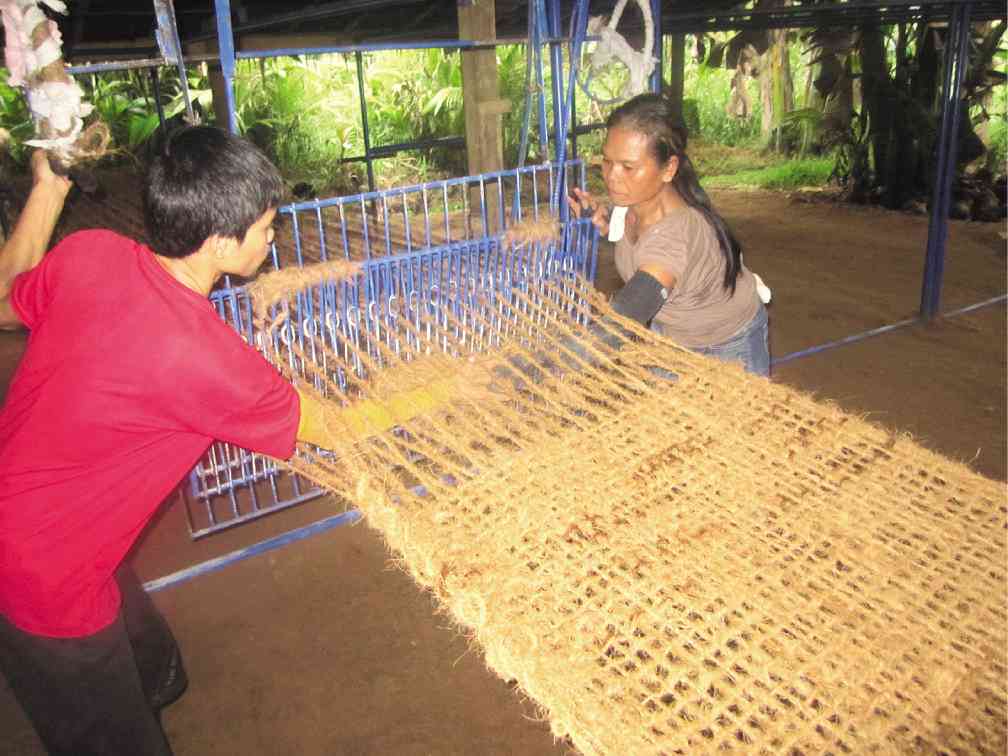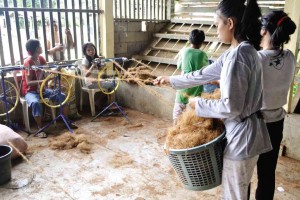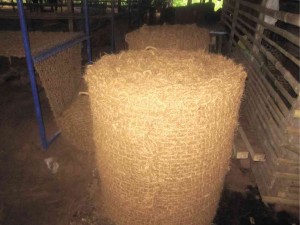Agusan women owe their livelihood to coco coir

A MAN helps his mother in weaving coco coir to produce a roll of the
eco-friendly geonet. PHOTO BY CHRIS V. PANGANIBAN
SAN FRANCISCO, Agusan del Sur—The women of Barangay Ladgadan here now lead better lives.
Some 50 women from this remote village are twiners of coco coir, a rope fiber fashioned from coconut husks and woven into geonets or rolls of fiber mesh nets used in preventing soil erosion and landslides.
The thriving livelihood was started by three women. Other residents who saw it to be a good source of income later joined in. With more women participating, the organizers decided to turn the barangay hall into a manufacturing center. Later, the provincial office of the Department of Trade and Industry (DTI) provided the women a fabricated bicycle rim twiner to help them in their twining activities.
Erlinda Boholts, 55 and a mother of six, says the coco coir industry gives her a daily income of at least P200, more than enough to augment the income of her husband, a village councilman who tends a half-hectare rice and vegetable farm.
Boholts says that before, the women at the village would spend their days gossiping around the neighborhood while some got hooked on tong-its, a gambling game.
“Life was very hard then. We just relied on the income we got from our farms. Most of the time, crops would be damaged by heavy flooding that normally swept the village,” Boholts says.
Junrey Sagaral, a village councilman, says other families earn even more since children would also help in the twining chores during weekends. A family with four twiners in their backyard may earn an average of P6,000 every 15 days.
The coco coir, with a length of 12 meters, is sold at P4.50 apiece to the Kaagap Development Multipurpose Cooperative (Kaagapmuco) in Hubang village, 11 km near the town center.
Kaagapmuco will then process the coco coir using a manual loom. Women cooperative members also earn at least P200 a day.
Loom weaver Narsita Cemacio says her earnings helped her in sending a daughter to the Caraga State University in Butuan City.
Rionel Anino, a trade and industry development specialist of DTI Agusan del Sur, reveals that their office has provided Kaagapmuco 10 weaving machines at the height of the demand for geonets. Much of that demand came from the Department of Public Works and Highways, which used it for its road construction projects, as well as mining firms in the Caraga Region.
The DTI also distributed some 100 twiners to the women in Ladgadan village and other home-based makers in other parts of the province.
Anino says only 20 percent of the raw material can be extracted from a coconut. The rest are made up of coconut dust produced during the milling process. The same dust may also be used to make organic fertilizers, which the cooperative plans to produce sometime soon.
Lolita Dorado, DTI provincial director, says the cooperative is a recipient of the agency’s Shared Service Facility (SSF) program which provides equipment to small and medium enterprises.
Ramon Barbosa, regional manager of the Philippine Coconut Authority in Caraga, says five coir processing centers, complete with the machinery needed to support the value-adding activities for coconut, were established last year.
The project is funded by a grant from the Strengthening of Agro-Industrial Sector in Bicol and Caraga (SAIS-BC)—a program jointly implemented by the Philippine government through the Department of Agriculture, and the Spanish government through the Agencia Espanola Cooperacion International para el Desarollo (AECID).
Max Robles, chair of Kaagapmuco, says there is now a strong demand for geonets since the government recommended these to cover sloping terrain and embankments to prevent soil erosion and landslides.

WOMEN in a remote village of Agusan del Sur use coconut husk fibers to produce a mesh that can prevent soil erosion. PHOTO BY CHRIS V. PANGANIBAN
Apart from their proven high tensile strength, the coco coir products are abundant and ecofriendly. The biodegradable material promotes vegetation growth as it traps topsoil and keeps its nutrients intact, Robles explains.
Even big mining companies in Surigao del Norte and Surigao del Sur use geonets on sloping areas near communities and highways to prevent landslides.
Last year, Robles says, they were in a hurry to produce 1,000 geonets rolls because of an urgent order from the DPWH and mining companies. Since then, he adds, the average demand is 1,000 rolls a month.
Even resorts in Misamis Oriental and Bohol recently ordered some 500 rolls to be used on the slopes near the shoreline.
Robles says the cooperative will also venture into integrated coconut processing, producing virgin coconut oil, flour and organic fertilizers.
